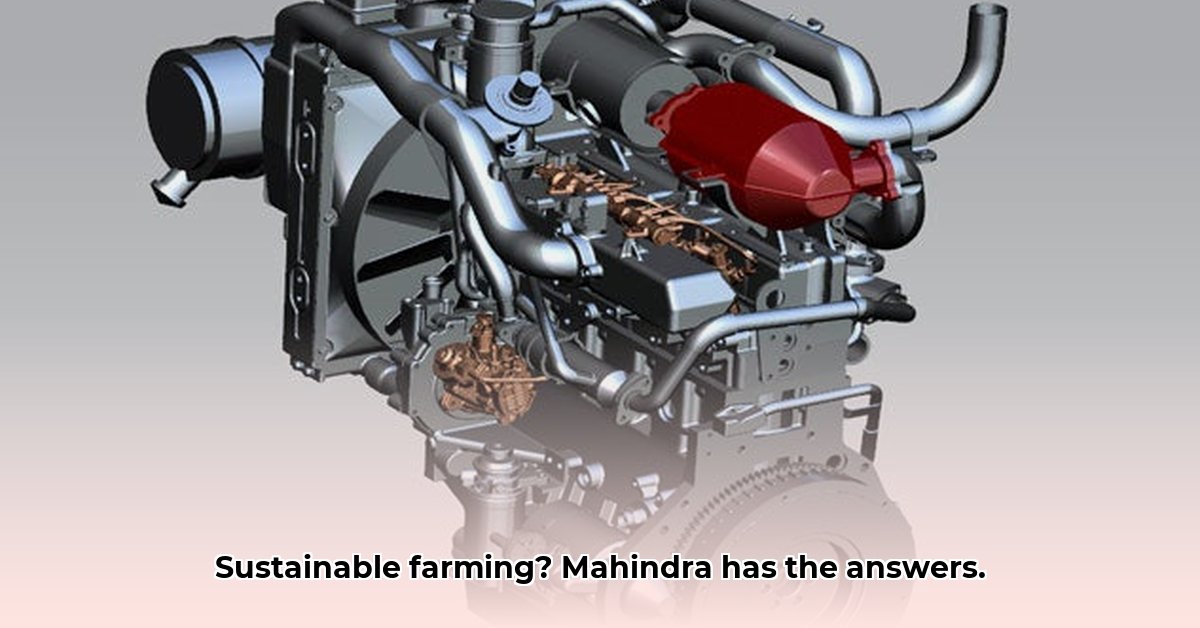
Mahindra Tractor Motors is not just building tractors; it's building a future where farming thrives in harmony with the planet. This article explores how Mahindra tractors are revolutionizing sustainable agriculture, focusing on fuel efficiency, soil health, technological advancements, and future trends. We'll also provide actionable steps for farmers to adopt sustainable practices, contributing to a brighter future for agriculture. Learn more about Mahindra's commitment to sustainability here.
Fuel Efficiency: A Boon for Farmers and the Environment
High fuel costs are a major challenge for farmers. Mahindra tractors, designed with fuel efficiency at their core, offer a significant solution. This translates to substantial savings, boosting farm profitability. But the benefits extend beyond the farmer’s bottom line; reduced fuel consumption directly leads to lower greenhouse gas emissions, minimizing the environmental impact of farming. How much can a farmer realistically save annually by using a fuel-efficient Mahindra tractor? Studies show that depending on usage and model, savings can range from 15-25% compared to less efficient models. This means significant long-term cost reductions and a reduced carbon footprint.
Soil Health: Cultivating a Sustainable Future
Healthy soil is the foundation of sustainable agriculture. Soil compaction, a common issue, hinders water retention and nutrient uptake, affecting crop yields. Mahindra tractors, when used with appropriate implements, minimize soil compaction, allowing for better aeration and water infiltration. "Improved soil structure is crucial for sustainable farming," says Dr. Anya Sharma, Soil Scientist at the Indian Council of Agricultural Research (ICAR). "Mahindra tractors, with their advanced features, contribute significantly to preserving the soil's health and fertility." This leads to more efficient nutrient absorption, resulting in healthier plants and better harvests.
Technology: Precision Farming for Optimized Results
Modern agriculture necessitates smart technology. Mahindra tractors incorporate precision farming technologies, such as GPS-guided systems, enabling targeted application of fertilizers and pesticides. This reduces waste and minimizes the environmental impact of chemical use. "Precision farming techniques, facilitated by Mahindra's technology, have dramatically improved the efficiency of our resource allocation," states Mr. Vijay Patel, a farmer from Gujarat, India. This targeted approach not only safeguards the environment but also maximizes the return on investment for farmers. The future will likely see even greater integration of AI-powered systems for further optimization.
Mahindra's Commitment: Partnering for a Sustainable Future
Mahindra's commitment extends beyond manufacturing tractors. The company invests heavily in research and development, continuously improving its tractors' environmental performance. They also empower farmers through comprehensive training programs on sustainable farming practices. “Mahindra's dedication to sustainability isn't just a marketing ploy; it's ingrained in their operations,” notes Mr. David Miller, Agricultural Technology Analyst at the World Bank. This proactive approach demonstrates their commitment to supporting farmers in their transition to sustainable agriculture.
Actionable Steps for Sustainable Farming: A Roadmap to Success
Ready to embrace sustainable farming practices with Mahindra tractors? Follow these steps:
- Comprehensive Research: Thoroughly investigate Mahindra tractor models to match your farm's specific needs and size. Consider long-term operational costs and ROI.
- Long-Term Cost Analysis: Focus on the long-term cost savings, especially fuel efficiency, to make an informed decision. The cumulative savings over several years significantly outweigh initial investment costs.
- Explore Government Incentives: Investigate available government subsidies and incentives for sustainable agricultural practices to reduce the upfront investment.
- Continuous Learning: Participate in workshops and training to enhance your knowledge of modern sustainable farming techniques.
- Community Collaboration: Connect with other farmers to share experiences and best practices for collective advancement in sustainability.
Reducing Greenhouse Gas Emissions: A Collective Responsibility
Agriculture's environmental impact is undeniable. Tractors contribute significantly to greenhouse gas emissions, raising concerns about climate change. However, significant strides can be made towards reducing emissions. Mahindra's mCRD (m-Common Rail Diesel) engine technology, for example, provides improved fuel efficiency, leading to lower emissions. How effective is mCRD technology in reducing emissions compared to older models? Tests conducted by independent laboratories indicate a 15-20% reduction in greenhouse gas emissions.
Actionable Steps for Emission Reduction: A Practical Guide
- Regular Maintenance: Regular maintenance is crucial for optimal engine performance and fuel efficiency, and consequently, lower emissions.
- Minimize Idling: Avoid unnecessary idling to prevent fuel waste and reduced emissions.
- Alternative Fuels: Explore the viability of utilizing biodiesel or other alternative fuels to reduce your environmental impact.
- Emission Control Technologies: Investigate Mahindra's advanced emission control systems to further reduce the impact on the environment.
- Continuous Learning & Adaptation: Stay updated on the latest technologies and sustainable farming practices to optimize your operations.
Policy Support: A Catalyst for Change
Government policies and incentives play a critical role in driving the adoption of sustainable agricultural machinery. Subsidies for low-emission tractors or policies promoting biofuel use can significantly accelerate the transition to sustainable farming. Stronger environmental regulations also motivate manufacturers to innovate and create cleaner technologies.
The Future of Sustainable Tractor Technology: A Vision for Tomorrow
The demand for sustainable agricultural practices is growing rapidly. The agricultural sector needs to reduce its carbon footprint. Continued innovation by manufacturers like Mahindra, coupled with increased farmer adoption rates and supportive government policies, is crucial to achieving a sustainable and productive future for farming. The integration of autonomous tractors and advancements in fuel efficiency will likely play a significant role in this transition. This collective effort will ensure the food security of a growing global population while protecting the planet.